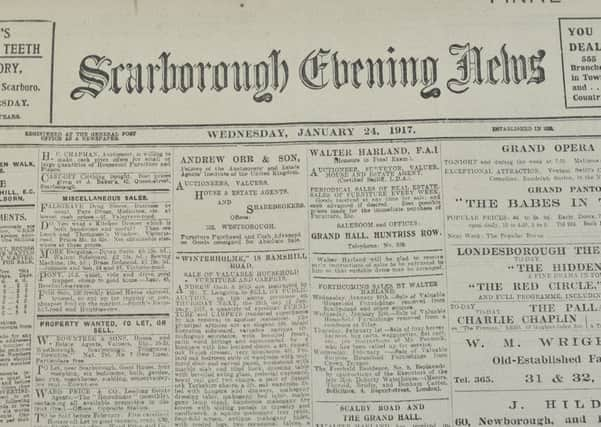1917 court: Unruly boy scouts in court for pilfering


One of the lads had gone into Mr CE Withnell’s shop, and enquired the price of a photograph case. Subsequently the police took a pocket knife bearing the name of the firm on it, to Mr Withnell, and he identified it as his property, but did not know it had been taken or who had taken it. He remembered, however, a boy going in to ask the price of a photograph case.
One of the boys had gone in, as stated, and the other remained outside. The latter knew the other boy was going to take something - the knives were on the counter. The lad who took it later “swapped” the knife to another boy for threepence and a fountain pen.
Advertisement
Hide AdAdvertisement
Hide AdAsked why he took the knife, the boy replied: “I just thought I would like it.”
Alderman Ascough: But you knew it was not yours?
The boy said he was very sorry, and would not do it again.
One of the boys was also charged with being concerned with the theft of three military badges from Mr Hamper’s shop in Aberdeen Walk.
He admitted taking two and a third boy had taken one.
Three badges were about the counter, and the chief constable said that although the cases were not serious, boys were systematically going into shops, enquiring for articles, and one or other of them pilfered something.
When questioned the boys said that other lads had talked about doing these things, and they made up their minds to do as they had done.
Advertisement
Hide AdAdvertisement
Hide AdAlderman Ascough: But you knew it was wrong? The answer was in the affirmative.
The lads had attended school - the three went to the same school - regularly, but at times Mr AC Myers, attendance officer, said they had been found untruthful.
The chief said that the lads, and others not charged, were members of the Holy Trinity Boy Scouts, and unfortunately they had been utilising that fact to shield them from suspicion.
They had actually boasted that the police would never suspect the Scouts and they had gone about systematically pilfering from shops. It might make an impression on the other boys if the magistrates would speak to them. Concluding, the chief gave details of various petty thefts the lads had committed, and admitted. In one case it was alleged that one of the lads had purchased some toffee at a shop, taken the shop key and then thrown it at the shop-keeper. The father of the lad alleged to have done this said the shop-keeper had said his boy was not the one.
The fathers of two of the lads were at the front.
Advertisement
Hide AdAdvertisement
Hide AdMr W Sayner: Did they wear uniform at the time? The answer was in the negative.
Alderman Ascough: No, they don’t wear uniform.
Miss Barker said that one of the boys was a scout, but she did not quite know of the others - the curate was going to attend. She thought some boys said they were scouts
By Alderman Ascough: One or two scouts masters had gone recently.
The chief constable said that the curate (Mr Horsefield) had intended being present. They had lost touch, somewhat, with the lads, as a room was now used for soldiers.
Advertisement
Hide AdAdvertisement
Hide AdThe two other boys said they had been scouts, the father of one telling him “to take his clothes in,” as he was out quite late at night. It was said that he bought his, and still had it.
Two other boys were then called in, and addressed by the magistrates.
The chief said some lads seemed to have some idea that if only one went into a shop and took something the others could say they did not do so, whereas, in law, they were equally guilty.
The father of one of the lads admonished said he had the boy under control, but he had got into mischief after joining the scouts, and going out at night to attend scout gatherings. He had told the boy to leave and send his clothes in.
Advertisement
Hide AdAdvertisement
Hide AdIt was said that owing to the leaving of the scoutmasters there was no control, and Alderman Ascough said he thought it would have been better if the troop had been disbanded. He added that the boys met in a room with no one to take charge of them.
The magistrates (Mr G Rowntree) presiding, bound the three boys charged, over, under the Probation Act, and ordered a payment towards the costs of 5s for each boy in each case. The chairman urged them to do better, and pointed out to them that their conduct not only discredited themselves and their parents, but also other boy scouts. He hoped that all five boys would grow up a credit to themselves, and all concerned.